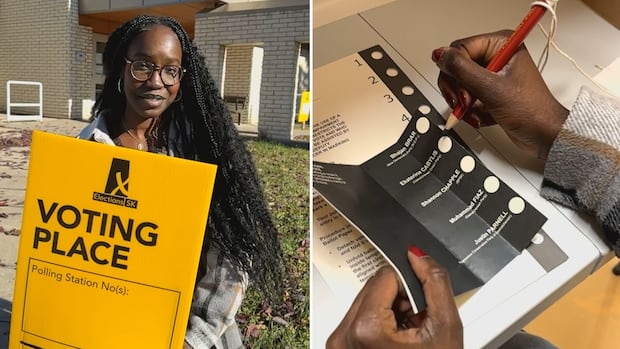Saskatchewan voters who haven’t already cast their ballots will be able to do that today, the final day of polling before the province decides which party will form the next government.
Over the past month of campaigning, parties have duelled over issues like health care, safety, education and affordability.
Their jabs and hooks come to a head in Monday’s election, with the Saskatchewan Party looking to form its fifth consecutive government, while the Saskatchewan NDP looks to return to power for the first time since 2007.
Five other parties are also on the ballot: the Buffalo Party of Saskatchewan, the Progressive Conservative Party of Saskatchewan, the Saskatchewan Green Party, the Saskatchewan Progress Party and the Saskatchewan United Party.
Entering the 2024 election, the governing Saskatchewan Party held 42 of the 61 seats in the legislature, while the Opposition NDP had 14. Three seats were held by Independents and one by Saskatchewan United.
One seat was vacant after Gordon Wyant, a Saskatchewan Party MLA, resigned to run as a candidate in Saskatoon’s upcoming mayoral race.
In the 2020 election, the Saskatchewan Party formed government with 48 seats to the NDP’s 13. No other party landed a seat in the legislature.
A few seats changed hands following that election — the NDP took control of two Regina seats in byelections but lost its long-held Athabasca seat, in the province’s north, to the Saskatchewan Party.
Three MLAs elected as Saskatchewan Party candidates in 2020 — Randy Weekes, Ryan Domotor and Greg Lawrence — were sitting as Independents when the election was called.
Nadine Wilson, who was also elected as a Saskatchewan Party candidate, later sat as an Independent and then a member of the Saskatchewan United Party.

Busy day
Bonnie Marwood said she’s seen a steady stream of people arriving to vote at a Saskatoon polling station since 9 a.m.
“Despite the advance polls we’ve had quite a bit of action today,” said Marwood, a supervising deputy returning officer. “It’s nice to see the variety of age ranges. The youth are just as involved as the elderly.”
How to vote
Canadian citizens who have been a Saskatchewan resident for at least six months and are at least 18 years old can vote at the locations found here.
First time voting? Here’s everything you need to know as Saskatchewan goes to the polls for the provincial election this week.
To cast a ballot, voters will need either a driver’s licence or two pieces of identification from Elections Saskatchewan’s approved list, at least one of which must have your address.
If you don’t have ID, another eligible voter who lives in the same constituency and knows you can vouch for you in person.
Polls opened at 9 a.m. CST on Monday and close at 8 p.m., when election workers will start counting the ballots by hand.
Saskatchewan’s chief electoral officer has said he expects the count will take until midnight. Last year, the Saskatchewan Party government voted to ban counting machines in the provincial election, rejecting the officer’s recommendation.
Early voting over five days totalled 273,010, about 33 per cent of the province’s nearly 811,000 eligible voters, according to Elections Saskatchewan. In the 2020 election, 184,742 people cast a ballot in early voting.
Overall turnout in the 2020 election hit 52.9 per cent, the second lowest in Saskatchewan’s history.
Follow CBC’s election coverage
Live results will begin to populate this page after polls close at 8 p.m. CST.
CBC’s special election coverage begins at 7:30 p.m. CST and will continue into the evening. For more information on how to watch and listen, check out our election night coverage here.
How does the CBC make projections in an election? Well, let’s go behind the scenes and find out what goes into calls and managing coverage on election night. The team works hard to ensure that results are brought to you accurately every time.

